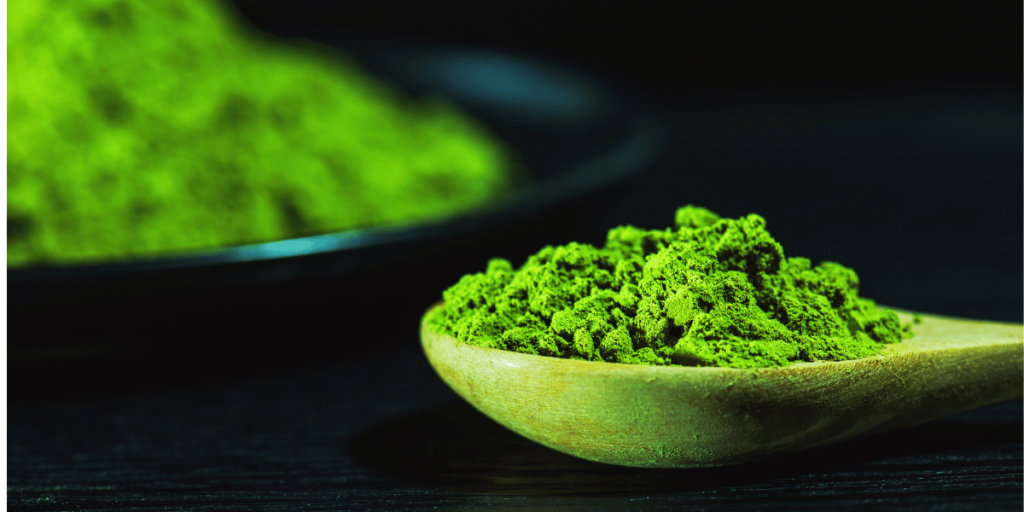Intermittent fasting (IF) has gained widespread popularity for its potential health benefits, including weight loss, improved insulin sensitivity, and enhanced metabolic health. A common question among those practicing intermittent fasting is whether consuming matcha tea breaks a fast or affects the process of autophagy.
This explores the implications of consuming matcha during a fast, delving into its impact on various health aspects and incorporating keywords relevant to fasting and overall health.
Understanding Intermittent Fasting
Intermittent fasting (IF) is a dietary approach that cycles between periods of eating and fasting. It is not a diet in the conventional sense but rather a pattern of eating.
Common IF protocols include the 16/8 method, where individuals fast for 16 hours and eat during an 8-hour window, and the 5:2 diet, where calorie intake is restricted for two non-consecutive days each week. Other variations include alternate-day fasting and the Eat-Stop-Eat method.
Fasting Period and State
The fasting period refers to the time when no caloric intake occurs, allowing the body to enter a fasting state. During this time, several physiological processes occur, including a reduction in insulin levels, improved insulin sensitivity, and the initiation of autophagy—a cellular cleaning process that removes damaged cells and regenerates new ones.
The fasting state is characterized by metabolic changes that shift the body from using glucose as its primary energy source to utilizing stored fat.
The Role of Matcha in Fasting
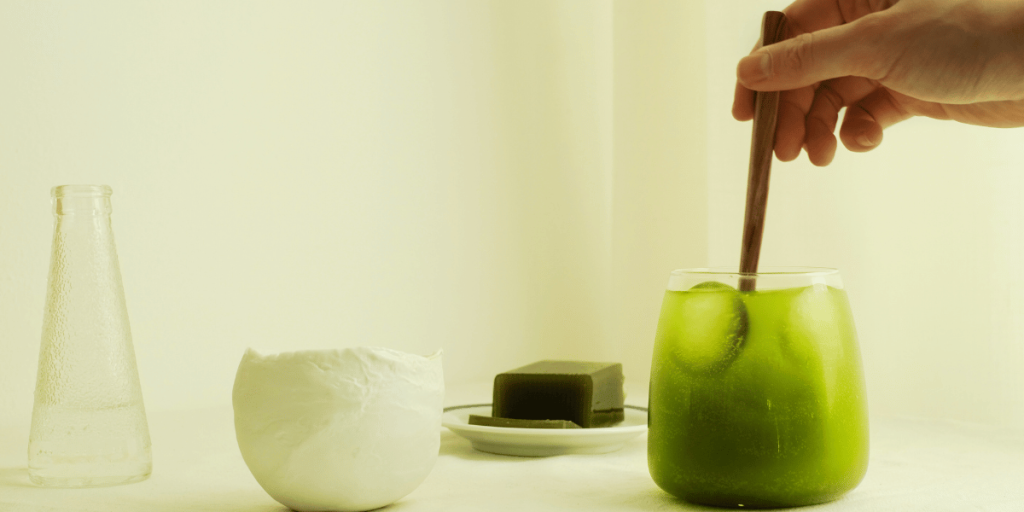
Matcha is a powdered form of green tea leaves known for its high levels of catechins, particularly epigallocatechin gallate (EGCG), which has potent antioxidant properties. Matcha offers several potential health benefits, but its impact on fasting and autophagy requires careful consideration.
Caloric Content and Insulin Response
One of the primary concerns during fasting is the caloric content of consumed beverages. Matcha, when prepared traditionally with hot water, contains minimal calories—typically less than 3 calories per gram. Consuming such a small amount of calories is unlikely to impact insulin levels or break a fast significantly.
However, adding sweeteners, milk, or other caloric ingredients, such as in a matcha latte, can disrupt the fasting state by triggering an insulin response.
The primary goal of fasting is to reduce insulin levels and improve insulin sensitivity. When you consume foods or beverages that contain calories, your body releases insulin in response to the intake, which can break your fast.
Therefore, it is crucial to be mindful of what you consume during the fasting period to avoid disrupting these benefits.
Impact on Autophagy
Autophagy is a critical process during fasting that promotes cellular health and longevity. The activation of autophagy is influenced by nutrient availability and caloric intake. Since matcha contains minimal calories and is rich in antioxidants, it is generally considered safe to consume during fasting without significantly affecting autophagy.
The antioxidants in matcha, particularly EGCG, may even enhance autophagy by reducing oxidative stress and promoting cellular repair.
Oxidative stress occurs when there is an imbalance between free radicals and antioxidants in the body. The antioxidants in matcha help neutralize free radicals, thereby reducing oxidative stress and potentially enhancing the autophagy process. This makes matcha a beneficial addition to a fasting regimen focused on promoting cellular health.
Health Benefits of Matcha During Fasting
Consuming matcha during fasting can offer several health benefits without breaking the fast or negatively impacting autophagy. Here are some key advantages:
Weight Loss and Metabolic Health
Matcha can support weight loss and metabolic health by boosting metabolism and promoting fat oxidation. The catechins in matcha, especially EGCG, have been shown to increase energy expenditure and enhance fat burning, making it a great option for those aiming to lose body fat. Studies have suggested that consuming green tea catechins can lead to significant reductions in body fat and overall body weight.
Calorie restriction during fasting also contributes to weight loss. By incorporating matcha, which can enhance metabolic rate and fat oxidation, individuals may experience more efficient weight loss results. Additionally, the combination of fasting and matcha consumption can help regulate appetite and reduce hunger pangs, making it easier to adhere to the fasting regimen.
Improved Cognitive Function
Fasting has been associated with improved cognitive function and mental clarity. Matcha, which contains both caffeine and L-theanine, can further enhance cognitive function by promoting alertness and reducing stress levels. This combination of compounds provides a steady release of energy without the jittery effects often associated with other caffeinated beverages.
L-theanine, an amino acid found in matcha, promotes relaxation and reduces anxiety by increasing the production of alpha waves in the brain. This creates a state of calm alertness, which is particularly beneficial during fasting when maintaining focus and mental clarity is essential. The synergy between caffeine and L-theanine in matcha can help enhance mood, attention, and cognitive performance.
Reduced Oxidative Stress and Inflammation
Oxidative stress and chronic inflammation are linked to various health conditions, including metabolic syndromes and chronic diseases. The antioxidants in matcha help combat free radicals and reduce oxidative stress, potentially lowering the risk of chronic inflammation and related health issues.
Chronic inflammation is a contributing factor to many chronic diseases, including cardiovascular disease, diabetes, and certain cancers. The anti-inflammatory properties of matcha can help mitigate these risks. Additionally, fasting itself has been shown to reduce markers of inflammation, further enhancing the health benefits when combined with matcha consumption.
Considerations and Best Practices
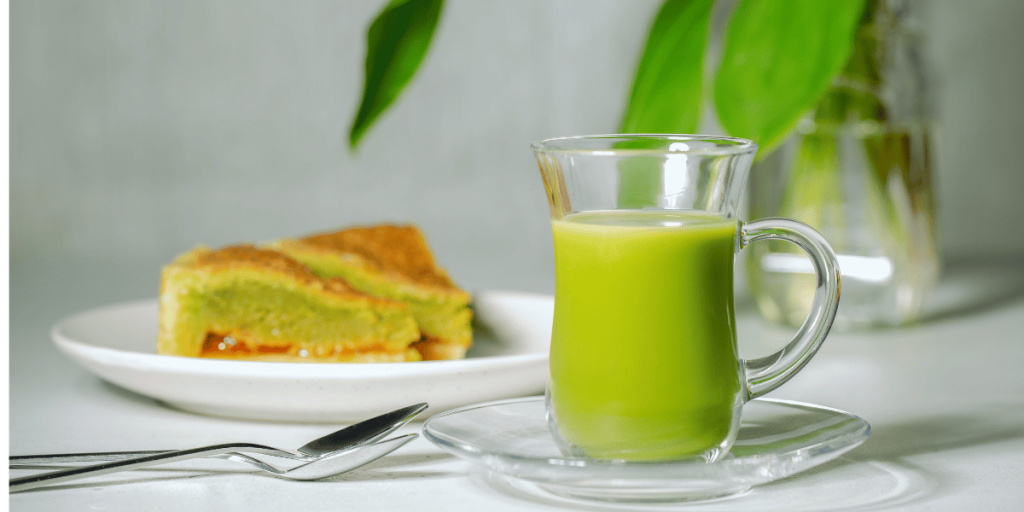
While matcha can be a beneficial addition to an intermittent fasting plan, it is essential to consume it mindfully and in moderation. Here are some considerations and best practices to ensure you reap the benefits without compromising your fasting state.
Avoiding Additives
To ensure that matcha does not break your fast, it is crucial to avoid adding caloric ingredients such as sugar, milk, or cream. Instead, opt for plain matcha prepared with hot water. If you prefer a slightly sweet taste, consider using zero-calorie sweeteners like monk fruit or stevia.
Artificial sweeteners, while low in calories, may still elicit an insulin response in some individuals. It is best to experiment with different options and observe how your body responds. Apple cider vinegar and lemon juice can also be added to enhance flavor without adding significant calories.
Monitoring Individual Responses
Each individual’s response to fasting and specific foods can vary. It is advisable to monitor how your body responds to matcha during fasting and consult with a healthcare provider if you have any concerns or pre-existing medical conditions. Some people may experience digestive discomfort or heightened sensitivity to caffeine, so it is essential to listen to your body and adjust accordingly.
Understanding Different Types of Fasting
Intermittent fasting encompasses various methods, including time-restricted eating, water fasting, and dry fasting. The impact of matcha may vary depending on the type of fasting you are practicing. For example, during dry fasting, no liquids are consumed, so matcha would not be appropriate. However, during water fasting or time-restricted eating, matcha can be a beneficial addition.
Time-restricted eating, where individuals consume all their calories within a specific eating window, allows for more flexibility in beverage choices. Matcha can be consumed during the fasting period or within the eating window, depending on individual preferences and goals. Understanding the nuances of different fasting protocols can help tailor the approach to matcha consumption.
The Science Behind Fasting and Autophagy
To understand the impact of matcha on fasting and autophagy, it is essential to delve deeper into the scientific mechanisms underlying these processes.
Insulin Sensitivity and Blood Sugar Levels
Fasting helps improve insulin sensitivity, which is crucial for maintaining healthy blood sugar levels. Insulin sensitivity refers to how effectively the body’s cells respond to insulin, a hormone that regulates blood sugar. When insulin sensitivity is high, cells can efficiently take up glucose from the bloodstream, preventing blood sugar spikes.
Matcha, with its minimal caloric content, is unlikely to cause significant changes in insulin levels. However, it is essential to avoid adding sugar or other high-calorie ingredients to maintain the benefits of improved insulin sensitivity during fasting.
Autophagy and Cellular Health
Autophagy is a natural process that occurs in the body during periods of nutrient deprivation, such as fasting. It involves the breakdown and recycling of damaged cellular components, promoting cellular health and longevity. This process is crucial for maintaining overall health and preventing the accumulation of dysfunctional cells.
Research has shown that autophagy plays a significant role in preventing chronic diseases, including cancer, neurodegenerative disorders, and cardiovascular diseases. By consuming matcha, which is rich in antioxidants, individuals may enhance the autophagy process by reducing oxidative stress and promoting cellular repair.
Metabolic Health and Caloric Restriction
Caloric restriction during fasting leads to several metabolic adaptations that promote health and longevity. These adaptations include reduced insulin levels, increased fat oxidation, and improved lipid profiles. By consuming matcha, individuals can support these metabolic changes and potentially enhance the benefits of caloric restriction.
Matcha’s ability to boost metabolism and promote fat oxidation makes it a valuable addition to a fasting regimen focused on improving metabolic health. The catechins in matcha have been shown to increase thermogenesis, the process by which the body generates heat and burns calories. This can further support weight loss and metabolic improvements.
Practical Tips for Incorporating Matcha into Your Fasting Routine
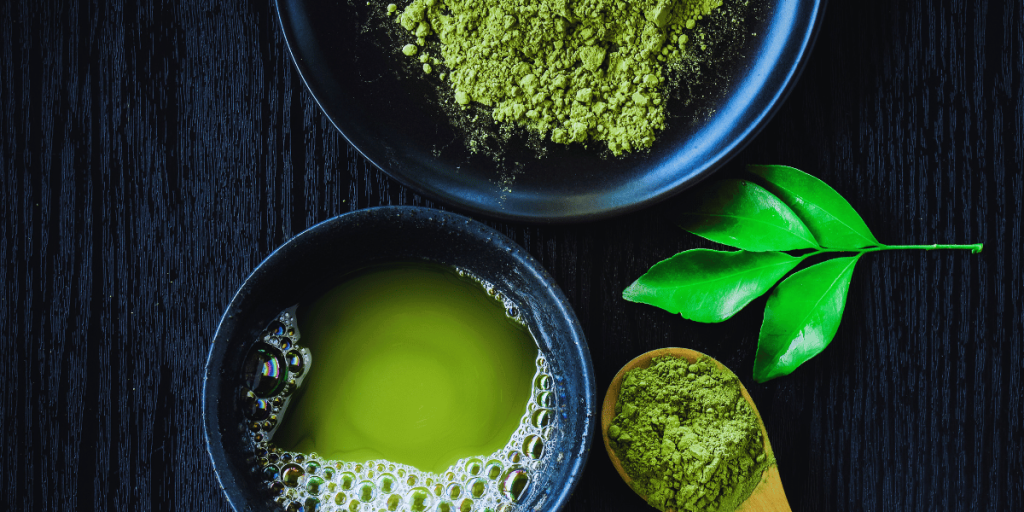
To maximize the benefits of matcha during fasting, consider the following practical tips:
Choose High-Quality Matcha: Opt for high-quality matcha powder that is pure and free from additives. Look for ceremonial-grade matcha, which is made from the youngest tea leaves and offers the highest concentration of beneficial compounds.
Prepare Matcha Properly: To make a traditional matcha drink, whisk one to two teaspoons of matcha powder with hot water until frothy. Avoid using boiling water as it can degrade the beneficial compounds in matcha. Instead, use water that is around 175°F (80°C).
Timing Matters: Consider consuming matcha during the early hours of your fasting window. The caffeine and L-theanine in matcha can help improve focus and energy levels, making it an ideal beverage to start your day or during mid-morning when energy levels typically dip.
Stay Hydrated: Although matcha can contribute to your fluid intake, ensure you are drinking enough water throughout the day to stay hydrated. This is especially important during fasting when you are not consuming food that contains water.
Experiment with Recipes: While plain matcha with hot water is the best option during fasting, you can experiment with recipes during your eating window. For example, make a matcha latte with almond milk or blend matcha powder into smoothies for an antioxidant boost.
Listen to Your Body: Pay attention to how your body responds to matcha. If you experience any digestive discomfort, anxiety, or difficulty sleeping due to the caffeine content, consider adjusting the amount you consume or the time of day you drink it.
Exploring the Broader Health Benefits of Matcha
In addition to its potential benefits during fasting, matcha offers a wide range of health benefits that can contribute to overall well-being.
Heart Health
Matcha contains compounds that support heart health by improving cholesterol levels and reducing blood pressure. The catechins in matcha have been shown to lower LDL (bad) cholesterol and increase HDL (good) cholesterol, reducing the risk of cardiovascular diseases. Additionally, the antioxidants in matcha help prevent the oxidation of LDL cholesterol, which is a key factor in the development of atherosclerosis.
Cognitive Function and Mental Health
The combination of caffeine and L-theanine in matcha not only enhances cognitive function but also supports mental health. Studies have shown that L-theanine can promote relaxation, reduce anxiety, and improve sleep quality. This makes matcha a beneficial beverage for those looking to enhance mental clarity and reduce stress levels.
Antioxidant Powerhouse
Matcha is packed with antioxidants, which are essential for protecting the body against oxidative stress and free radical damage. These antioxidants, particularly EGCG, have been shown to have anti-inflammatory, anti-cancer, and anti-aging properties. Regular consumption of matcha can help reduce the risk of chronic diseases and promote overall health.
Weight Management
The combination of catechins and caffeine in matcha can aid in weight management by boosting metabolism and promoting fat burning. This makes matcha an effective addition to a weight loss regimen. Additionally, matcha can help regulate appetite and reduce cravings, making it easier to adhere to a healthy diet.
Matcha and Specific Health Conditions
Individuals with certain health conditions may find matcha particularly beneficial. However, it is important to consult with a healthcare provider before making any significant changes to your diet.
Diabetes
For individuals with diabetes, maintaining stable blood sugar levels is crucial. Matcha can help improve insulin sensitivity and lower blood sugar levels, making it a beneficial beverage for those managing diabetes. However, it is essential to monitor blood sugar levels and consult with a healthcare provider to ensure matcha consumption aligns with your diabetes management plan.
Digestive Health
The antioxidants and anti-inflammatory properties of matcha can support digestive health by reducing inflammation in the gut and promoting a healthy gut microbiome. This can be particularly beneficial for individuals with conditions such as irritable bowel syndrome (IBS) or inflammatory bowel disease (IBD).
However, the caffeine content in matcha may cause digestive discomfort in some individuals, so it is important to start with small amounts and monitor your body’s response.
Cancer Prevention
The high concentration of antioxidants in matcha, particularly EGCG, has been shown to have anti-cancer properties. These antioxidants help protect cells from DNA damage and inhibit the growth of cancer cells. While matcha should not be considered a cure for cancer, regular consumption can be part of a healthy lifestyle that supports cancer prevention.
The Impact of Matcha on Different Types of Fasting
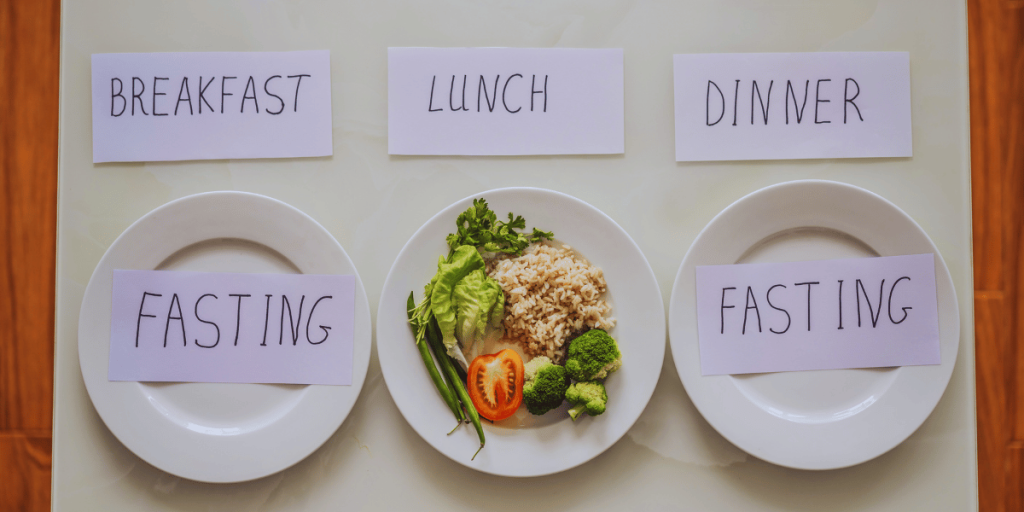
Different types of fasting protocols may influence the suitability of matcha consumption. Here’s a closer look at how matcha can fit into various fasting methods:
Time-Restricted Eating
Time-restricted eating (TRE) involves consuming all calories within a specific eating window, typically 8-10 hours, and fasting for the remaining hours of the day. Matcha can be consumed during the fasting period in TRE protocols, as its minimal caloric content and beneficial compounds align with the goals of fasting.
Alternate-Day Fasting
Alternate-day fasting (ADF) involves alternating between days of regular eating and days of restricted calorie intake (usually around 500-600 calories). On fasting days, consuming plain matcha can help maintain energy levels and promote fat oxidation without breaking the fast.
Extended Fasting
Extended fasting involves fasting for periods longer than 24 hours. During extended fasting, it is crucial to avoid any caloric intake to fully benefit from autophagy and other metabolic changes. While matcha’s caloric content is minimal, it is best to avoid it during prolonged fasting periods to ensure no disruption to the fasting state.
Water Fasting
Water fasting involves consuming only water for a set period. Since matcha contains a small amount of calories, it is not suitable for strict water fasting. However, for those following modified water fasts that allow for minimal caloric intake, plain matcha can be considered.
Matcha in the Context of Other Zero-Calorie Beverages
When considering beverages to consume during fasting, it is helpful to compare matcha with other popular zero-calorie options.
Black Coffee
Black coffee is a common choice for those practicing intermittent fasting due to its zero-calorie content and appetite-suppressing effects. Both black coffee and matcha contain caffeine, but matcha also provides the added benefits of L-theanine and antioxidants. While black coffee can enhance metabolism and fat burning, matcha offers a more balanced energy boost without the jittery effects.
Herbal Teas
Herbal teas, such as chamomile, peppermint, and rooibos, are popular zero-calorie beverages during fasting. They provide hydration and can help curb hunger pangs. Matcha differs from herbal teas in its caffeine content and antioxidant profile, making it a more energizing option with additional health benefits.
Water
Water is the ultimate zero-calorie beverage and is essential for staying hydrated during fasting. While water should be the primary beverage consumed during fasting, matcha can be a beneficial addition for those seeking an energy boost and enhanced metabolic benefits.
Potential Side Effects and Considerations
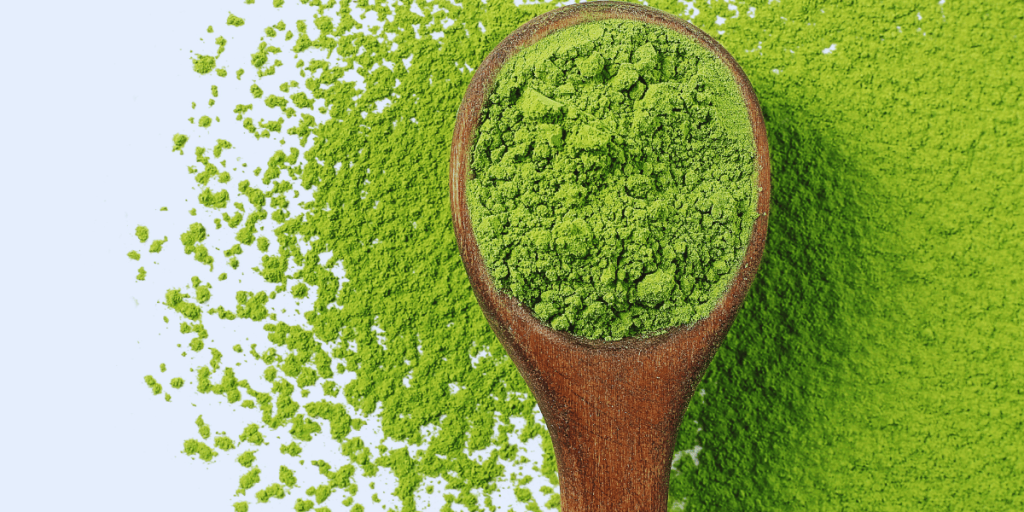
While matcha offers numerous health benefits, it is important to be aware of potential side effects and considerations.
Caffeine Sensitivity
Matcha contains caffeine, which can cause jitteriness, anxiety, and insomnia in individuals sensitive to caffeine. It is important to monitor your caffeine intake from all sources and adjust the amount of matcha consumed to avoid adverse effects.
Digestive Discomfort
Some individuals may experience digestive discomfort, such as nausea or stomach upset, when consuming matcha. Starting with small amounts and gradually increasing the intake can help minimize these effects. Additionally, consuming matcha with food or during the eating window may reduce digestive discomfort.
Quality and Purity
The quality of matcha can vary significantly. Low-quality matcha may contain additives, contaminants, or lower concentrations of beneficial compounds. It is important to choose high-quality, pure matcha from reputable sources to ensure you are receiving the full health benefits.
Integrating Matcha into a Balanced Lifestyle
While matcha can enhance the benefits of intermittent fasting, it is essential to integrate it into a balanced lifestyle for optimal health.
Balanced Diet
A balanced diet rich in whole foods, such as fruits, vegetables, lean proteins, and healthy fats, is crucial for overall health. Matcha can complement a balanced diet by providing additional antioxidants and nutrients. However, it should not be relied upon as a sole source of nutrition.
Regular Exercise
Regular physical activity is essential for maintaining a healthy weight, improving cardiovascular health, and enhancing overall well-being. Combining matcha consumption with a regular exercise routine can further boost metabolism and support weight management.
Mindful Eating
Practicing mindful eating involves paying attention to hunger and fullness cues, eating slowly, and savoring each bite. Incorporating matcha into a mindful eating practice can enhance the enjoyment of this nutritious beverage and promote a healthy relationship with food.
The Future of Fasting and Matcha Research
As interest in intermittent fasting and matcha continues to grow, ongoing research is likely to uncover more about their health benefits and potential synergies. Future studies may explore the impact of matcha on specific health conditions, the long-term effects of combining matcha with various fasting protocols, and the optimal dosages for maximizing benefits.
Personalized Nutrition
Advancements in personalized nutrition may also play a role in understanding how matcha and fasting can be tailored to individual needs. Genetic testing, microbiome analysis, and other personalized health assessments can provide insights into how different individuals respond to matcha and fasting, allowing for more customized approaches.
Conclusion
Incorporating matcha into your fasting routine can offer numerous health benefits without breaking your fast or negatively impacting autophagy. Its low caloric content, combined with its rich antioxidant profile, makes it an excellent choice for those practicing intermittent fasting.
However, it is essential to consume matcha mindfully and avoid additives that may disrupt the fasting state. By doing so, you can enjoy the benefits of both intermittent fasting and matcha, promoting overall health and well-being.
Ultimately, the decision to include matcha in your fasting regimen should be based on individual preferences, health goals, and how your body responds. Consulting with a healthcare provider can provide personalized guidance and ensure that matcha consumption aligns with your overall health plan. With mindful consumption, matcha can be a powerful ally in your journey towards better health and longevity.
*Some of the links on this blog are affiliate links. This means if you click on the link and purchase the item, I will receive an affiliate commission.


